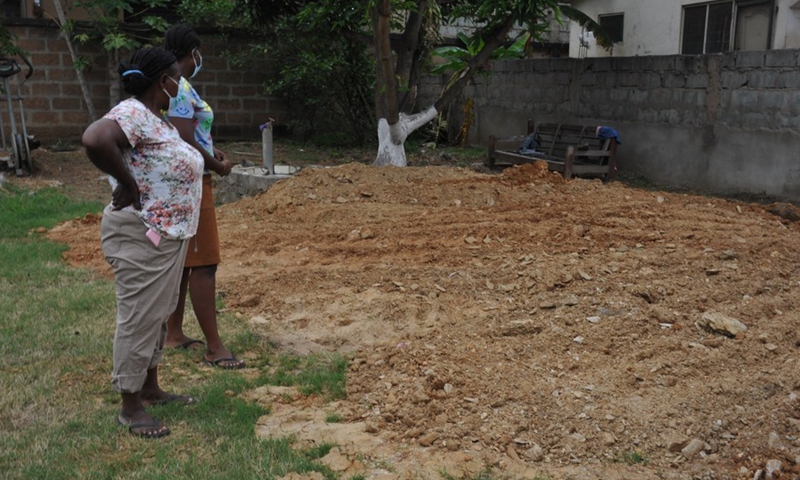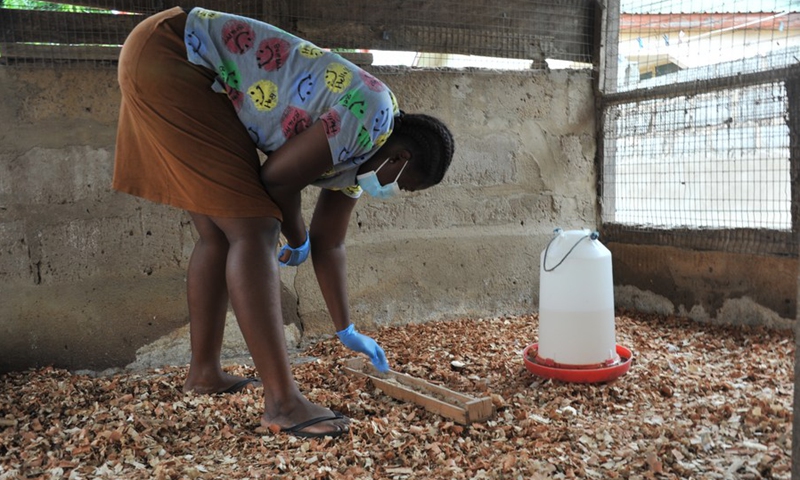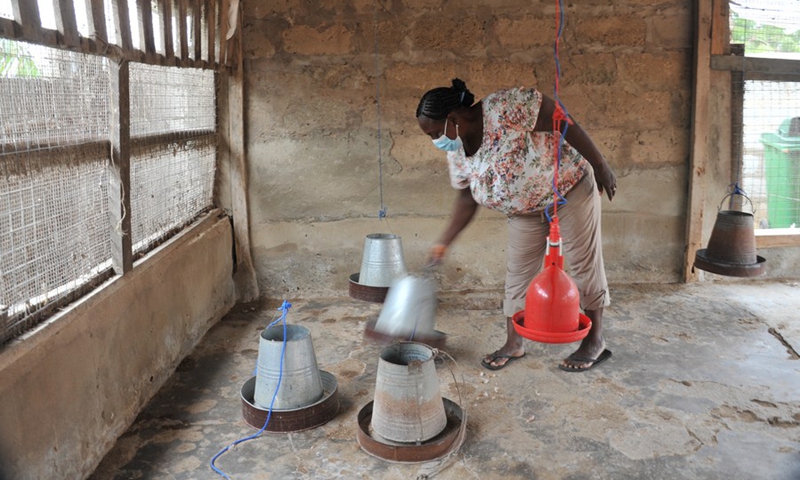
A Ghanaian mother stands with her daughter at the farm where the chickens were buried in Accra, Ghana, on July 19, 2021.(Photo: Xinhua)

A daughter of Mary Arthur, checks linear feeder at her mother's farm after the avian flu outbreak in Accra, Ghana, on July 19, 2021.(Photo: Xinhua)

Mary Arthur, owner of the Countryside Farms, checks poultry feeder at her farm after the avian flu outbreak in Accra, Ghana, on July 19, 2021.(Photo: Xinhua)
The outbreak of avian influenza compounded the plight of Ghanaian poultry sector, said some farmers told Xinhua.
Michael Nyarko-Ampem, president of the Greater Accra Regional Poultry Farmers Association, told Xinhua that the flu outbreak coupled with the existing challenge of shortage and high cost of feed constituted double jeopardy to the industry.
"It is indeed a kind of double jeopardy that has hit us on both sides. There is an Akan proverb that says a double slap makes you dizzy, and that is what we are going through," Nyarko-Ampem said. "Before this outbreak, we have been dealing with the unavailability of maize, wheat bran, and soya bean cake. In addition to that, these things have increased in prices."
"We are worried and concerned, particularly about the way the flu could spread, so it is critical that with the help of government and other agencies, we stem the spread of the disease immediately," the farmers' group leader said.
Although the impact of the flu at the moment was significant only on the individual farms and their employees, he said a further spread of the outbreak could have dire economic consequences for the industry, for jobs, and the entire Ghanaian economy.
"The impact on the industry will increase when people are not well informed and educated, and they start avoiding chicken and eggs. Once they do that, there is going to be a loss to the industry as eggs and birds could pile up and go bad," he stressed.
And with that, he said, "People will lose investments, and for people who took bank loans to stock their farms, the interests may pile up, and they would find it difficult to fulfill their parts of the obligation to their creditors."
As happened in all previous outbreaks, Nyarko-Ampem was confident that the state would compensate all farmers who would lose their birds to the flu.
He encouraged Ghanaians to continue patronizing poultry products since all the affected birds had been destroyed, suggesting that people should boil their chicken and eggs well before eating.
"But farmers are resilient, so we shall ride it out despite the challenges that are besetting us. We will ride it out, but we need the cooperation of everybody," he added.
According to Patrick Abekeh, director of the Veterinary Services Directorate of the Ministry of Food and Agriculture (MOFA), seven farms reported the avian flu outbreak from the Greater Accra, Volta, and Central Regions. And more than 10,000 poultry birds had been lost to the outbreak in Ghana this time.
Mary Arthur, owner of the Countryside Farms at Klagon near Accra, the capital of Ghana, told Xinhua she had lost all her birds. She said officials from the veterinary department had destroyed all the birds and their feed due to the flu outbreak.
"Through this poultry business, I have been able to fend for my family since my husband is a retiree and now bed-ridden. But I have lost all that now, and I have to start all over again," she told Xinhua.
After contracting a bank loan recently to expand the farm, Arthur did not know how to pay back the loan with all the birds gone.
She urged the government to come to the rescue of the affected farmers to restore their livelihoods.
The veterinary department of the Ministry of Food and Agriculture has been fighting to contain the bird flu outbreak in the West African country.
